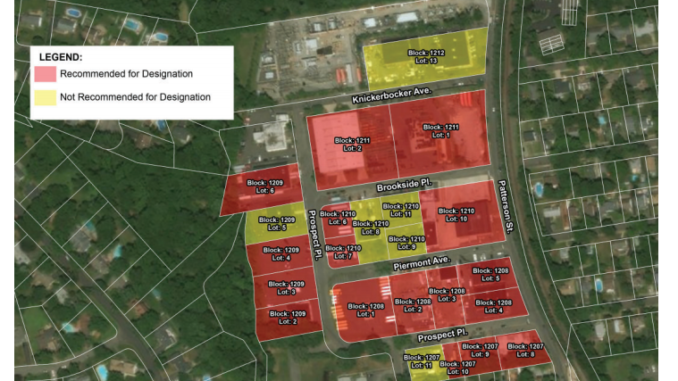
HILLSDALE, N.J.—A consultant tasked with redeveloping 14 acres in an industrial area is gearing up to present a range of options for the public and officials here to consider.
The scope of work includes 24 affordable housing units mandated under the borough’s affordable housing settlement. The public will get several opportunities to weigh in on redevelopment options.
Meanwhile, the town’s legal action opposing Waste Management’s transfer station activity in the borough is on hold at Hillsdale’s request.
DMR Architects of Hasbrouck Heights is crafting a redevelopment plan for 17 of 23 lots in the industrial area, which were declared in need of redevelopment in September 2019 following a redevelopment study the firm conducted.
After the Planning Board and governing body signed off on the study, DMR was awarded a $19,140 contract for planning services to produce a redevelopment plan on Nov. 12.
The plan will look at 17 lots bounded by Knickerbocker Avenue, Prospect Place, and Patterson Street, including Brookside Place and Piermont Avenue.
The firm prepared a 154-page preliminary investigation for determination of an area in need of redevelopment in May 2019. This was approved by council in September.
Following up on his comments at the recent Greater Pascack Valley Chamber of Commerce breakfast, Mayor John Ruocco told Pascack Press that officials from Waste Management, which voluntarily agreed to stop accepting waste at its local transfer station, is also awaiting action that the town will take following review of a redevelopment plan.
Ruocco had told Pascack Valley mayors Jan. 29 that Waste Management halted operations in exchange for a role in the local redevelopment process.
Ruocco said that redevelopment options for the property could be a financial incentive for the company to shed the facility, now often underused based on its total capacity for waste transfer.
Council President Frank Pizzella, who initiated efforts to declare the industrial zone as an area for redevelopment, told Pascack Press that “DMR is only beginning to create a test concept, which is basically many different ideas and options which are then reviewed by a financial expert who then plays out a variety of different scenarios.”
These, he said, are then presented to the council “to get an understanding of the various options available and the revenue each could generate. This educates council members about their options so that they can make an informed decision before making any commitments. It is very important because it [minimizes] risk exposure.”
Ruocco told Pascack Press, “One of the things we’ve been able to do is get them [Waste Management] to agree to cease the flow of garbage into the borough. The facility’s open but trucks have not been dropping off waste for months.”
The mayor said WMI likely views a redevelopment plan as “financially advantageous.”
The company is “looking to us to move ahead for redevelopment,” he added.
Ruocco said the borough advised Superior Court to “freeze” their bid opposing the company’s waste transfer permit because the two parties are cooperating.
Ruocco earlier told Pascack Press that its affordable housing agreement’s overlay zone in the industrial area calls for 24 affordable units, which means either about 160 rental units or 120 market-rate units at a 15% set-aside.
Ruocco noted the affordable housing settlement required affordable units in a redevelopment zone in the industrial area within three years of approval, or by approximately February 2021.
However, the agreement notes, “If a redevelopment area is not designated, the borough can use traditional zoning mechanisms to create these opportunities.”
Another possibility may be declaring a larger downtown area as an area in need of rehabilitation, Ruocco said.
This, he said, is another designation under the state Housing and Redevelopment Law that allows a municipality the legal basis to upgrade an area but under different criteria and financial incentives than under redevelopment designation.
Ruocco said that possibility “is on the distant horizon” with the council first needing to address redevelopment options and agree on a path forward with input from residents and affected property owners.
“A lot of what we may decide to do there [in the redevelopment zone] depends on the density and height of proposals,” Ruocco said.
Asked about a mixed-use development that provides retail business at ground level and second-floor apartments, Ruocco said he found that “unobjectionable.”
He said there could be other good options such as an assisted living center or senior facility.
Ruocco said whatever prevails “should make the town more attractive to residents and to newcomers.”
In May, DMR reported that based on the evidence gathered, including multiple site visits, review of all available building, fire, police, and tax assessor information, and available GIS, and NJDEP information it was determined the property meets Local Redevelopment and Housing Law Criterion “D.”
That states, “Areas with buildings or improvements which, by reason of dilapidation, obsolescence, overcrowding, faulty arrangement or design, lack of ventilation, light and sanitary facilities, excessive land coverage, deleterious land use or obsolete layout, or any combination of these or other factors, are detrimental to the safety, health, morals or welfare of the community,” DMR said.
